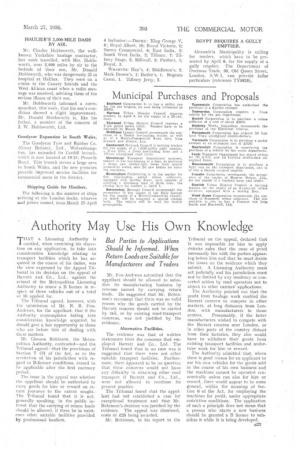Authority May Use His Own Knowledge
Page 37

If you've noticed an error in this article please click here to report it so we can fix it.
T°THAT a Licensing Authority is I entitled, when exercising his discretion on any application, to take into consideration knowledge relating to transport facilities which he has acquired in the course of his duties, was ilw view expressed by the Appeal Tribunal in its decision onthe appeal of Barrett and Co„ Ltd., against the refiisal of the Metropolitan Licensing AUthority to renew a B licence in respect of three vehicles -out of a total of 1.6 applied for.
The Tribunal agreed, however, with the submission of Mr. N. R. FoxAndrews, for the appellant. that if the Authority contemplates taking into consideration knowledge acquired. he should give a fair opportunity to those who are before him of dealing with these matters.
Mr. Gleeson Robinson, the Metropolitan Authority, contended—and the Tribunal agreed—that the provisions of Section 7 (3) of the Act, as to the rcstdction of his jurisdiction with regard to B-licence conditions, ceased to he applicable after the first currency period.
The issue in the appeal was whether the appellant should be authorized to carry goods for hire or reward on return journeys to the extent sought. The Tribunal found that it is not, generally speaking, in the public interest that the carrying of return loads should be allowed, if there be in existence other suitable facilities provided by professional hauliers. Mr. Fox-Andrews submitted that the appellant should be allowed to subsidize its manufacturing business by revenue earned by carrying return loads. He suggested that Mr. Robinson's statement that there was no valid reason why the goods carried by the Barrett concern should not be carried by rail, or by existing road-transport concerns, was not justified by the evidence.
Alternative Facilities.
The evidence was that of written statements from the concerns that employed Barrett and Co.. Ltd. The Tribunal found that in no case was it suggested that there were not other suitable transport facilities. Furthermore, there appeared to be no question that, these concerns would not have any difficulty in obtaining other road transport if Barrett and Co„ Ltd., were not allowed to continue its present practice.
The Tribunal found that the appellant had not established a case for exceptional treatment and that Mr. Robinson's decision was justified by the evidence. The appeal was dismissed, costs of .£25 being awarded. .
Mr. Robinson, in his report to the
Tribunal on the appeal, declared that it was impossible for him to apply definite rules that the onus of proof necessarily lies with the parties appearing before him and that he must decide the issues on the evidence which they submit, A Licensing Authority must act judicially and his jurisdiction must net ,be limited by any tendency or.concerted action by road operators not to object to other carriers' applications.
The Authority pointed out that the profit from haulage work enabled the Barratt concern to compete in -other markets, at long distances from London, with manufacturers in those centres. Presumably, if the latter manufacturers wished to compete with the Barrett concern near London, or in other parts of the country distant from their factorieS, they also would have to withdraw their goods' frcim existing transport facilities and undertake work for hire or reward.
The Authority admitted that, where there is good reason for an applicant to use his own vehicles for the goods sold in the course of his own business and the machines cannot be operated economically unless run also for hire or reward, there would appear to be some ground, within the meaning of Section 6 of the Act, for employing the machines for profit, under appropriate restrictive conditions. The application of such a principle does not mean that a person who starts a new business should be granted a B licence to subsidize it while it is being developed.




























































































